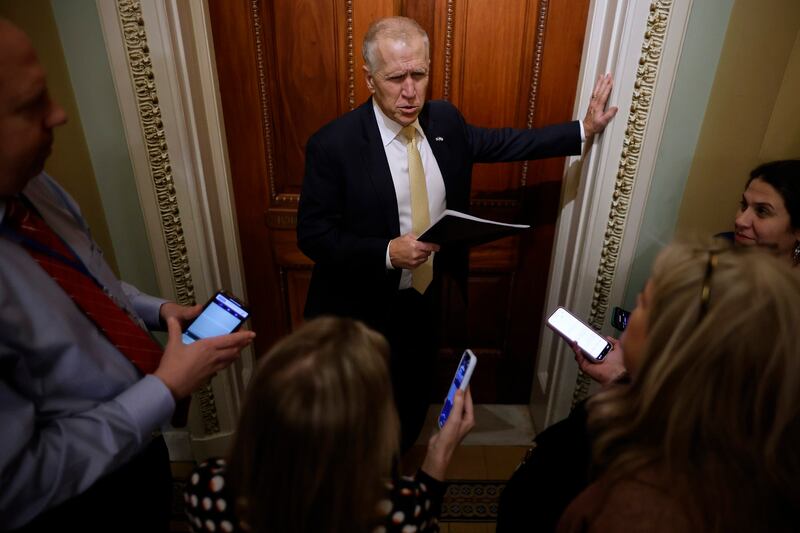The U.S. Senate on Tuesday passed a $95.3 billion bipartisan spending bill that includes $4.83 billion for Taiwan and other U.S. allies in the Indo-Pacific, but only after hours of midnight filibustering from Republican senators aligned with former President Donald Trump.
The funds set aside for the Indo-Pacific would replenish American weapons stockpiles to allow for shipments to Taiwan to be made while also meeting funding requests from the U.S. Indo-Pacific Command.
However, the bill still needs approval in the House, where opposition from Trump-allied Republicans looks set to prevent its passage.
The bill passed the Senate 70-29 just before 5 a.m. after Sen. Rand Paul, a Republican from Kentucky, and Sen. J.D. Vance, a Republican from Ohio, tried to prevent a vote by speaking against the bill through the night over $60 billion included for Ukraine, which Trump opposes.
Other Republican senators opposed the bill for not including any funding to stem illegal immigration on the southern U.S. border, which was included in a similar high-profile bill last week that failed following opposition from Trump and from House Republicans.
In the end, 22 of the Republican Party’s 49 senators – including Senate Minority Leader Mitch McConnell – joined with nearly all of the 51-seat Democratic majority in voting for the bill, allowing it to pass.
The only Democratic senators to vote “nay” were Sen. Jeff Merkley of Oregon, Sen. Peter Welch of Vermont and Sen. Bernie Sanders of Vermont, who is an independent but caucuses with Democrats. They cited the bill’s $14.1 billion of aid to Israel for its war with Hamas, and argued that Israel was treating all Palestinians as an enemy.
But Senate Majority Leader Chuck Schumer, a Democrat from New York who worked with McConnell to rework last week’s larger bill, said its passage was an achievement that should be celebrated.
“It's been years – perhaps decades – since the Senate has passed a bill that so greatly impacts not just our national security, not just the security of our allies, but also the security of Western democracy,” Schumer told reporters in an early morning press conference.
American resolve
U.S. President Joe Biden said he “applauded” the bipartisan grouping of senators who passed the aid for Ukraine, Israel and Taiwan and said he wanted the bill on his desk for signing as soon as possible.
“I urge the House to move on this with urgency,” Biden said. “If we do not stand against tyrants who seek to conquer or carve up their neighbors’ territory, the consequences for America’s national security will be significant. Our allies and adversaries alike will take note.”
The sentiment was echoed by some of the 22 Republicans in the Senate who broke with Trump to approve the legislation.
Sen. Thom Tillis of North Carolina said some of the concerns coming from his party in the House should be “respected.” But he said that, on balance, he supported the bill because “China is watching” whether the United States has the resolve to stick with its military allies.
“Why am I so focused on this vote? Because I don’t want to be on the pages of history that we will regret,” Tillis said on the Senate floor.
“If we walk away, you will see the alliance that is supporting Ukraine crumble. You will ultimately see China become emboldened,” he said. “Let this chamber be the chamber that stands with the free world.”

“History settles every account,” added McConnell, the minority leader, in a statement. “And today, on the value of American leadership and strength, history will record that the Senate did not blink.”
But those lawmakers’ defiance of Trump has not been without cost.
McConnell's negotiations with Democrats on the bill, for example, has led to caustic criticism from Trump-allied members of his caucus, with Sen. Josh Hawley of Missouri declaring "McConnell is probably not the future" of the party, after leading it in the Senate for 17 years.
Still, Schumer, at least, has been effusive about the cooperation.
Speaking at a Washington Press Club Foundation dinner late last month, Schumer quipped that in the cross-party talks over the funding bill, "I guess you could say I got 99 problems, but Mitch ain't one."
House opposition
No matter its margin of support in the Senate, though, the $95.3 billion bill may be dead on arrival in the House of Representatives.
House Speaker Mike Johnson, another Trump ally, said on Monday he would not even introduce the legislation for a vote in the lower chamber, where the Republicans hold a slim 219-212 majority.
That has led to complaints from Democrats.

Schumer in his Tuesday press conference said that given there were 22 Republicans in the Senate who voted “yes” in spite of the vocal opposition from Trump, he expected it would be easy to also find at least four Republicans in the House to secure a majority there.
“I call on Speaker Johnson to rise to the occasion, to do the right thing: bring this bill to the floor,” Schumer said, predicting it would pass.
“With the strong bipartisan support we have here in the Senate, with this vote, I believe that if Speaker Johnson brought this bill to the House floor, it will pass with the same strong bipartisan support.”
But Johnson has said he simply did not like the border provisions included in last week’s bill from the Senate and wanted them to be revamped, not removed. The House will therefore “have to continue to work on its own will on these important matters,” he said.
Still, any redrafting of the bill by the House would introduce further complications, with senators unlikely to be able to vote for weeks.
The Senate is not due to sit again until Feb. 26. When it does, it will be just days before government funding is due to run out once again, putting that at the top of the legislative agenda in both chambers.
Edited by Malcolm Foster.
